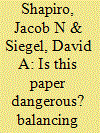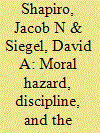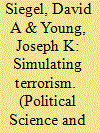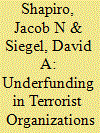| Srl | Item |
| 1 |
ID:
097362


|
|
|
|
|
| Publication |
2010.
|
| Summary/Abstract |
We analyze a seemingly simple question: When should government share private information that may be useful to terrorists? Policy makers' answer to this question has typically been "it is dangerous to share information that can potentially help terrorists." Unfortunately, this incomplete response has motivated a detrimental increase in the amount of information government keeps private or labels "sensitive but unclassified." We identify two distinct types of private information that are potentially useful to terrorists and identify the range of conditions under which sharing each can enhance counterterrorism efforts. Our results highlight the complex trade-offs policy makers face in deciding how much openness is right in a world where protecting the people from terrorists has become a central duty of government.
|
|
|
|
|
|
|
|
|
|
|
|
|
|
|
|
| 2 |
ID:
112510


|
|
|
|
|
| Publication |
2012.
|
| Summary/Abstract |
Terrorist groups repeatedly include operatives of varying commitment and often rely on a common set of security-reducing bureaucratic tools to manage these individuals. This is puzzling in that covert organizations are commonly thought to screen their operatives very carefully and pay a particularly heavy price for record keeping. The authors use terrorist memoirs and the internal correspondence of one particularly prominent group to highlight the organizational challenges terrorist groups face and use a game-theoretic model of moral hazard in a finitely sized organization to explain why record keeping and bureaucracy emerge in these groups. The model provides two novel results. First, in small heterogeneous organizations longer institutional memory can enhance organizational efficiency. Second, such organizations will use worse agents in equilibrium under certain conditions. The core logic is that in small organizations the punishment strategies that allow leaders to extract greater effort are credible only when operatives can identify and react to deviations from the leaders' equilibrium strategy. This dynamic creates incentives for record keeping and means that small organizations will periodically use problematic agents in equilibrium as part of a strategy that optimally motivates their best operatives.
|
|
|
|
|
|
|
|
|
|
|
|
|
|
|
|
| 3 |
ID:
167425


|
|
|
|
|
| Summary/Abstract |
Personnel management at the top of terrorist groups presents a puzzle. Commanders act off-message reasonably often, sometimes angering powerful backers. When this happens group leaders typically have the means and incentives to kill the commander. Yet, we often observe group leaders dismissing them instead. This gives those commanders an opportunity to work against the movement by providing aid to the government or starting a competing group. Why would rational leaders act this way? We argue formally that this is a consequence of having to satisfy two “masters,” a common problem in organizational behavior but as of yet underexplored in the study of terrorist organizations. Our model elucidates the substantive factors that underlie a leader's fraught personnel decision when caught in such a bind, here conceptualized as between backers and an important constituency. We develop implications for organizational functioning and structure, government action against groups, and the effect of technological innovations on leaders’ incentives.
|
|
|
|
|
|
|
|
|
|
|
|
|
|
|
|
| 4 |
ID:
098249


|
|
|
|
|
| Publication |
2009.
|
| Summary/Abstract |
We present two simulations designed to convey the strategic nature of terrorism and counterterrorism. The first is a simulated hostage crisis, designed primarily to illustrate the concepts of credible commitment and costly signaling. The second explores high-level decision making of both a terrorist group and the state, and is designed to highlight scarce-resource allocation and organizational dynamics. The simulations should be useful both in a traditional classroom setting as well as to the larger public. We provide a primer on the subject matter, and all the material necessary to run the simulations.
|
|
|
|
|
|
|
|
|
|
|
|
|
|
|
|
| 5 |
ID:
127834


|
|
|
|
|
| Publication |
2013.
|
| Summary/Abstract |
How do global sources of information such as mass media outlets, state propaganda, NGOs, and national party leadership affect aggregate behavior? Prior work on this question has insufficiently considered the complex interaction between social network and mass media influences on individual behavior. By explicitly modeling this interaction, I show that social network structure conditions media's impact. Empirical studies of media effects that fail to consider this risk bias. Further, social network interactions can amplify media bias, leading to large swings in aggregate behavior made more severe when individuals can select into media matching their preferences. Countervailing media outlets and social elites with unified preferences can mitigate the effect of bias; however, media outlets promulgating antistatus quo bias have an advantage. Theoretical results such as these generate numerous testable hypotheses; I provide guidelines for deriving and testing hypotheses from the model and discuss several such hypotheses.
|
|
|
|
|
|
|
|
|
|
|
|
|
|
|
|
| 6 |
ID:
102067


|
|
|
| 7 |
ID:
078288


|
|
|
|
|
| Publication |
2007.
|
| Summary/Abstract |
A review of international terrorist activity reveals a pattern of financially strapped operatives working for organizations that seem to have plenty of money. To explain this observation, and to examine when restricting terrorists' funds will reduce their lethality, we model a hierarchical terror organization in which leaders delegate financial and logistical tasks to middlemen, but cannot perfectly monitor them for security reasons. These middlemen do not always share their leaders' interests: the temptation exists to skim funds from financial transactions. When middlemen are sufficiently greedy and organizations suffer from sufficiently strong budget constraints, leaders will not fund attacks because the costs of skimming are too great. Using general functional forms, we find important nonlinearities in terrorists' responses to government counter-terrorism. Restricting terrorists' funds may be ineffective until a critical threshold is reached, at which point cooperation within terrorist organizations begins to break down and further government actions have a disproportionately large impact
|
|
|
|
|
|
|
|
|
|
|
|
|
|
|
|